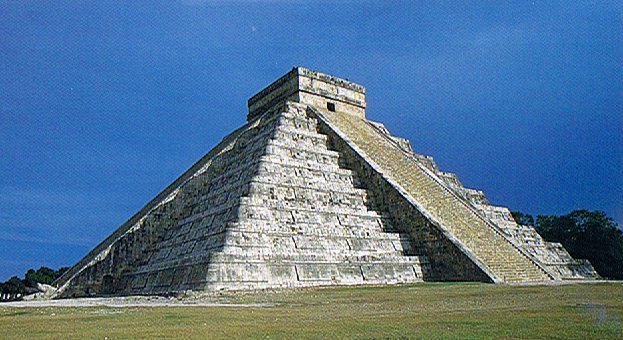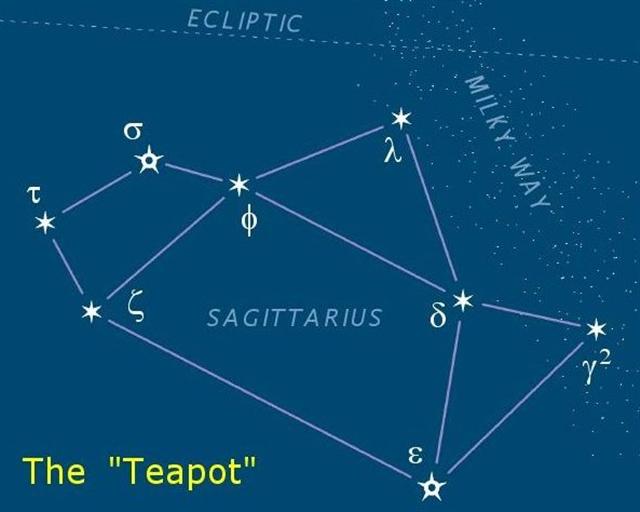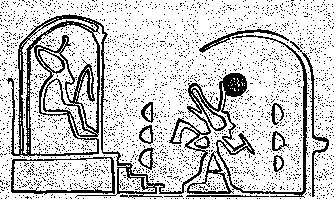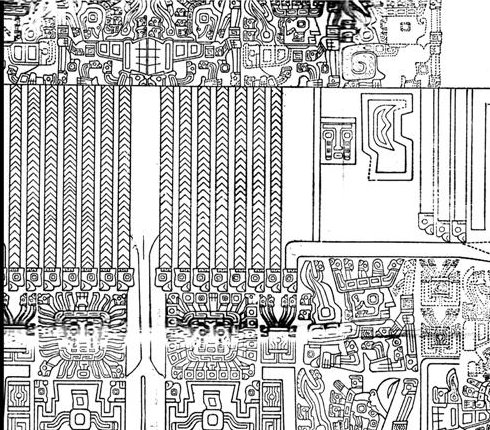The
pyramid
of
Kukulkan
(the
Feathered
Serpent)
alias
Quetzal-coatl
had
91
steps
leading
up
to
its
flat
apex:

...
Behind
me,
towering
almost
100 feet
into the
air, was
a
perfect
ziggurat,
the
Temple
of
Kukulkan.
Its four
stairways
had 91
steps
each.
Taken
together
with the
top
platform,
which
counted
as a
further
step,
the
total
was 365.
This
gave the
number
of
complete
days in
a solar
year. In
addition,
the
geometric
design
and
orientation
of the
ancient
structure
had been
calibrated
with
Swiss-watch
precision
to
achieve
an
objective
as
dramatic
as it
was
esoteric:
on the
spring
and
autumn
equinoxes,
regular
as
clockwork,
triangular
patterns
of light
and
shadow
combined
to
create
the
illusion
of a
giant
serpent
undulating
on the
northern
staircase
...
This
represented
the
top
(sky,
head)
part
of
the
year,
from where
entropy
would increase
when
water
(time)
ran
down
along
the
sides.
Later,
when
Nunki
was
close
to
the
Full
Moon,
Maui
by
working
hard
and
using
his
hiki
incantation
would manage
to
draw
up
Land from
under
the
accumulated
water
down
there
in the
southwest
(toga).
Life
is a
force
of
decreasing
entropy.
The
beautiful
little
Rei
at
Furud
(ζ
Canis
Majoris)
could
possibly
have
marked
the
aperture
to
a
'foot
path
of
flagstones'
on
this
comparatively
horizontal
Land:

| ●APRIL 8 |
9 (99) |
10 (*20) |
11 |
12 |
13 |
| APRIL 19 |
20 (*30) |
21 (111) |
22 |
23 |
24 |
 |
 |
 |
 |
 |
 |
| Ga1-29 |
Ga1-30 |
Ga2-1 (31) |
Ga2-2 |
Ga2-3 |
Ga2-4 |
| Al Han'ah-4 / Maru-sha-pu-u-mash-mashu-7 |
Furud (94.9) |
Well-22 / Arkū-sha-pu-u-mash-mashu-8 |
no star listed (96) |
β Monocerotis, ν Gemini (97.0) |
no star listed (98) |
| TEJAT PRIOR (93.4), γ Monocerotis (93.5), κ Aurigae (93.6), κ Columbae (93.8) |
δ Columbae (95.2), TEJAT POSTERIOR, Mirzam (95.4), CANOPUS (95.6), ε Monocerotis (95.7), ψ1 Aurigae (95.9) |
| June 22 |
23 |
St John's Eve |
25 |
26 (177) |
27 |
| 'May 26 |
27 |
28 (*68) |
29 |
30 (*70) |
31 |
| "May 12 |
13 |
14 (*54) |
15 |
16 (136) |
17 |
| 183 days later: |
| ●OCTOBER 8 (¤100) |
9 |
10 (ф264) |
11 |
12 (285) |
13 |
 |
 |
 |
 |
 |
 |
| Ga8-9 |
Ga8-10 |
Ga8-11 (214) |
Ga8-12 |
Ga8-13 |
Ga8-14 |
| OCTOBER 19 |
20 |
21 (*214) |
22 (295) |
23 |
24 |
| η Sagittarii (276.9) |
Purva Ashadha-20 |
Kaus Borealis (279.3) |
ν Pavonis (280.4), κ Cor. Austr. (280.9) |
Abhijit-22 |
| KAUS MEDIUS, κ Lyrae (277.5), Tung Hae (277.7) |
φ Oct. (278.1), KAUS AUSTRALIS (278.3), ξ Pavonis (278.4), Al Athfar (278.6) |
θ Cor. Austr. (281.0), VEGA (281.8) |
| December 22 |
23 (357) |
X-mas Eve |
25 |
26 (360) |
27 |
| 'November 25 |
26 (*250) |
27 |
28 |
29 |
30 (*254) |
| "November 11 |
12 (*236) |
13 |
14 |
15 |
16 (320) |
| ●APRIL 14 (104) |
15 |
16 |
17 (*27) |
| APRIL 25 |
26 (*36) |
27 |
28 (118) |
 |
 |
 |
 |
| Ga2-5 |
Ga2-6 |
Ga2-7 |
Ga2-8 |
| ν Puppis (99.2), ψ3 Aurigae (99.4), ψ2 Aurigae (99.5)
Gemma
|
ψ4 Aurigae (100.5), Mebsuta (100.7) |
Sirius (101.2), ψ5 Aurigae (101.4), ν Gemini (101.6), ψ6 Aurigae (101.7) |
τ Puppis (102.2), ψ7 Aurigae (102.4) |
| June 28 |
29 |
SIRIUS (181) |
July 1 |
| 'June 1 (*72) |
2 |
3 (154) |
4 |
| "May 18 (*58) |
19 |
20 (140) |
21 |
| 183 days later: |
| ●OCTOBER 14 |
15 |
16 |
17 (290) |
 |
 |
 |
 |
| Ga8-15 |
Ga8-16 |
Ga8-17 (220) |
Ga8-18 |
| OCTOBER 25 |
26 |
27 (300) |
28 |
| no star listed (282) |
ζ Pavonis (283.4), λ Cor. Austr. (283.6), Double Double (283.7), ζ Lyrae (283.8) |
South Dipper-8 |
Sheliak, ν Lyrae (285.1), λ Pavonis (285.7)
Atlas
|
| Φ SAGITTARII (284.0), μ Cor. Austr. (284.6), η Cor. Austr., θ Pavonis (284.8) |
| December 28 |
29 |
30 (364) |
31 |
| 'December 1 |
2 |
3 (*257) |
4 |
| "November 17 |
18 |
19 |
20 (324) |

| Egyptian bread, (-t, female determinant) |
 |
Phoenician qoph |
 |
Greek phi |
Φ(φ) |
|
... is the 21st letter of the Greek alphabet ... Its origin is uncertain but it may be that phi originated as the letter qoppa ... In traditional Greek numerals, phi has a value of 500 or 500000 ...
Isaac Taylor, History of the Alphabet: Semitic Alphabets, Part 1, 2003: 'The old explanation, which has again been revived by Halévy, is that it denotes an 'ape,' the character Q being taken to represent an ape with its tail hanging down. It may also be referred to a Talmudic root which would signify an 'aperture' of some kind, as the 'eye of a needle,' ... Lenormant adopts the more usual explanation that the word means a 'knot' ...
... The king, wearing now a short, stiff archaic mantle, walks in a grave and stately manner to the sanctuary of the wolf-god Upwaut, the 'Opener of the Way', where he anoints the sacred standard and, preceded by this, marches to the palace chapel, into which he disappears. A period of time elapses during which the pharaoh is no longer manifest.

When he reappears he is clothed as in the Narmer palette, wearing the kilt with Hathor belt and bull's tail attatched. In his right hand he holds the flail scepter and in his left, instead of the usual crook of the Good Shepherd, an object resembling a small scroll, called the Will, the House Document, or Secret of the Two Partners, which he exhibits in triumph, proclaiming to all in attendance that it was given him by his dead father Osiris, in the presence of the earth-god Geb. 'I have run', he cries, 'holding the Secret of the Two Partners, the Will that my father has given me before Geb. I have passed through the land and touched the four sides of it. I traverse it as I desire.' ... |
| ●APRIL 18 (108) |
19 |
20 |
21 (*31) |
| APRIL 29 |
30 (*40) |
MAY 1 (121) |
2 |
 |
 |
 |
 |
| Ga2-9 (39) |
Ga2-10 |
Ga2-11 |
Ga2-12 |
| Mash-mashu-sha-Risū-9 |
Adara (104.8) |
ω GEMINI (105.4), Alzirr (105.7), Muliphein (105.8), Mekbuda (105.9) |
7h (106.5) |
| θ Gemini (103.0), ψ8 Aurigae (103.2), ALHENA (103.8), ψ9 Aurigae (103.9) |
no star listed (106) |
| July 2 |
3 |
4 (185) |
5 |
| 'June 5 |
6 |
7 (*78) |
8 |
| "May 22 |
23 |
24 (144) |
25 (*65) |
| 183 days later: |
| ●OCTOBER 18 (291) |
19 |
20 |
21 (*214) |
 |
 |
 |
 |
| Ga8-19 (222) |
Ga8-20 |
Ga8-21 |
Ga8-22 |
| OCTOBER 29 (302) |
30 |
31 (*224) |
NOVEMBER 1 |
| χ Oct. (286.0), Ain al Rami (286.2), δ Lyrae (286.3), κ Pavonis (286.5), Alya (286.6) |
ξ Sagittarii (287.1), ω Pavonis (287.3), ε Aquilae, ε Cor. Austr., Sulaphat (287.4), λ Lyrae (287.7), Ascella, Bered (Ant.) (287.9) |
Al Na'ām-18 / Uttara Ashadha-21 |
19h (289.2) |
| NUNKI (288.4), ζ Cor. Austr. (288.5), Manubrium (288.8), ζ Aquilae (288.9) |
λ Aquilae (Ant.) (289.1), γ Cor. Austr (289.3), τ Sagittarii (289.4), ι Lyrae (289.5), δ Cor. Austr. (289.8) |
| January 1 (366) |
2 |
3 |
4 |
| 'December 5 |
6 |
7 (*261) |
8 (342) |
| "November 21 (325) |
22 |
23 |
24 (*248) |

| ●APRIL 22 |
23 |
24 (114) |
25 |
26 (*36) |
| MAY 3 |
4 |
5 (125) |
6 (*46) |
7 |
 |
 |
 |
 |
 |
| Ga2-13 |
Ga2-14 |
Ga2-15 |
Ga2-16 (46) |
Ga2-17 |
| WEZEN (107.1), τ Gemini (107.7), δ Monocerotis (107.9) |
no star listed (108) |
λ Gemini (109.4), Wasat (109.8) |
no star listed (110) |
Aludra (111.1), Propus (111.4), Gomeisa (111.6) |
| July 6 |
7 (188) |
8 |
9 |
10 |
| 'June 9 |
10 |
11 |
12 |
13 (*84) |
| "May 26 |
27 |
28 (*68) |
29 |
30 (150) |
| 183 days later: |
| ●OCTOBER 22 (295) |
23 (*216) |
24 |
25 |
26 |
 |
 |
 |
 |
 |
| Ga8-23 |
Ga8-24 (227) |
Ga8-25 |
Ga8-26 |
Gb1-1 |
| NOVEMBER 2 |
3 (*227) |
4 |
5 (ф290) |
6 (310) |
| Al Baldah-19 |
Aladfar (291.1), Nodus II (291.5), ψ Sagittarii (291.6), θ Lyrae (291.8) |
ω Aquilae (292.1), ρ Sagittarii (292.6), υ Sagittarii (292.7) |
Arkab Prior (293.0), Arkab Posterior, Alrami (293.2), χ Sagittarii (293.6) |
Deneb Okab (294.0), α Vulpeculae (294.9) |
| AL BALDAH, Alphekka Meridiana (290.1), β Cor. Austr. (290.2) |
| January 5 |
6 |
7 (372) |
8 |
9 |
| 'December 9 |
10 (344) |
11 (*265) |
12 |
13 |
| "November 25 (329) |
26 (*250) |
27 |
28 |
29 |
I
think
we
with
confidence
can
translate
Mash-mashu-sha-Risū
as
the
Twins
of
the
Great
Rishi
Canopus
(Agastya),
he
who
by
drawing
up
the
whole
ocean
laid
bare
its
bottom,
viz.
Land
(Te
Henua,
much
like
Al
Hena
or
Al
Han'ah).

Should
we add
those
91 steps
(days) down
from
the
top
level to
123
level
flagstones
(glyphs,
days)
-
possibly measuring
out the
length
ahead
for the newborn
little
Land
- it
would amount
to
214
(twice
108).
Or
we
could
add
91 +
125
=
216
in
order
to
reach
ika
hiku
at
the
Yed door
of
exit:
| ●AUGUST 30 |
31 (243) |
 |
 |
| Ga7-4 (173) |
Ga7-5 |
| SEPTEMBER 10 |
11 (254) |
| ι Serpentis (237.4), ρ Oct., ψ˛ Lupi (237.5), γ Cor. Borealis (237.7), Unuk Elhaia (237.9) |
π Cor. Borealis, Cor Serpentis (238.1), Chow (238.6) |
| November 13 (317) |
14 (ф299) |
| 'October 17 (290) |
18 (ф272) |
| "October 3 (*196) |
4 (277) |
| 183 days later: |
| ●MARCH 1 (425) |
2 (61) |
 |
 |
| Gb5-3 (356) |
Gb5-4 (128) |
| MARCH 12 (436) |
13 (72) |
| Al Thurayya-27 / Krittikā-3 |
| Atiks, Rana (55.1), CELAENO, ELECTRA, TAYGETA (55.3), MAIA, ASTEROPE, MEROPE (55.6) |
ALCYONE (56.1), PLEIONE, ATLAS (56.3) |
| TAU-ONO |
Hairy Head-18 / Temennu-3 |
| May 15 (500) |
16 (136) |
| 'April 18 (108) |
19 (*29) |
| "April 4 (94) |
5 (460) |
| ●SEPTEMBER 1 |
2 (245) |
3 |
4 |
5 (ф229) |
 |
 |
 |
 |
 |
| Ga7-6 |
Ga7-7 |
Ga7-8 (177) |
Ga7-9 |
Ga7-10 |
| SEPTEMBER 12 |
13 (256) |
14 (*177) |
15 |
16 (ф240) |
| κ Serpentis (239.3), δ Cor. Borealis, Tiānrǔ (239.5), χ Lupi, (239.6), ω Serpentis (239.7), Ba, χ Herculis (239.8). κ Cor. Borealis, ρ Serpentis (239.9) |
β Tr. Austr. (240.3), κ Tr. Austr. (240.4), ρ Scorpii (240.8) |
Iklīl al Jabhah-15 / Anuradha-17 / Room-4 |
υ Herculis (242.3), ρ Cor. Borealis (242.4), ι Cor. Borealis (242.5), ξ Scorpii (242.7)
Schedir
|
16h (243.5) |
| (241.1), Zheng (241.2), VRISCHIKA (241.3), ε Cor. Borealis (241.5), Dschubba (241.7), η Lupi (241.9) |
Acrab, Jabhat al Akrab (243.3), θ Lupi, Rutilicus (243.5), Marfik (243.7), φ Herculis (243.8) |
| November 15 (ф300) |
16 (320) |
17 |
18 |
19 (¤142) |
| 'October 19 |
20 |
21 (ф275) |
22 (295) |
23 (¤115) |
| "October 5 |
6 |
7 (280) |
8 (ф262) |
9 (¤101) |
| 183 days later: |
| ●MARCH 3 |
4 (*348) |
5 (64) |
6 (ф46) |
7 |
 |
 |
 |
 |
 |
| Gb5-5 |
Gb5-6 (130) |
Gb5-7 (360) |
Gb5-8 |
Gb5-9 |
| 3-14 |
MARCH 15 |
16 (*360) |
17 (ф57) |
18 (77) |
| MENKHIB (57.6)
Porrima
|
Zaurak (58.9) |
λ Tauri (59.3), ν Tauri (59.9) |
4h (60.9) |
no star listed (61) |
| no star listed (60)
Cor Caroli |
| May 17 |
18 |
19 (ф120) |
20 (140) |
21 |
| 'April 20 |
21 (111) |
22 (ф93) |
23 (478) |
24 |
| "April 6 |
7 (ф78) |
8 |
9 (464) |
10 (100) |
The
tresses
on
the
back
side
of
Pacha-mama
(Mother
Earth),
measured
out
approximately
400
nights,
but
not
divided
evenly
into
200
+
200:

...
215
+
185
=
400
is
the
approximate
number
carefully
hidden
among
the
tresses
of
Pachamama
(the
Earth
Mother):
|
Counting the tresses from right to left: |
|
1 |
27 |
8 |
29 |
|
2 |
26 |
9 |
30.5 |
|
3 |
26.5 |
10 |
31 |
|
4 |
26.5 |
11 |
34 |
|
5 |
26.5 |
12 |
31 |
|
6 |
27 |
13 |
30 |
|
7 |
26 |
14 |
29 |
|
sum |
185.5 |
sum |
214.5 |
|
total = 400 |
...
Religion
then,
as
among
other
peoples
of
the
continent,
was
an
animism
based
on
cosmic
philosophy,
in
which
all
the
phenomena
of
nature
and
all
visible
things
which
had
a
relation
with
material
life,
were
animated.
The
ground,
the
food-giving
earth,
was
Pachamama;
the
moon,
Paximama;
the
lake, Kochomama.
Even
the
wind
was
a
divine
being,
Huayra-huirakjocha.
The
hills
and
especially
the
volcanos
were
also
considered
to
be
divinities
and
were
called
Achachilas. [A
footnote
explains
achachi
as
grandfather]
...
From
Anunitum
to
Spica
there
were
202
- 16
=
186
days.
Counting
again
in
the
undulating
tresses
of
Pachamama
-
after
having
realized
it
was
probably
the
number
of
apexes
which
mattered
-
the
intended
order
indeed
comes
clearly
into
view:
|
Counting the tresses from right to left: |
|
1 |
26 |
78 |
1 |
29 |
90 |
|
2 |
26 |
2 |
30 |
|
3 |
26 |
3 |
31 |
|
4 |
25 |
104 |
4 |
34 |
124 |
|
5 |
26 |
5 |
31 |
|
6 |
27 |
6 |
30 |
|
7 |
26 |
7 |
29 |
|
total = 396 |
Day 364 (twice 182) was probably the last day of the Sun year - as counted from Hyadum II - and day 364 - 183 = 181 (alluding to Sirius) was at Yed Prior in the last day of the first half of this year:
The dates from the time of the Hyades Gate can here be applied to the glyphs.
|








































